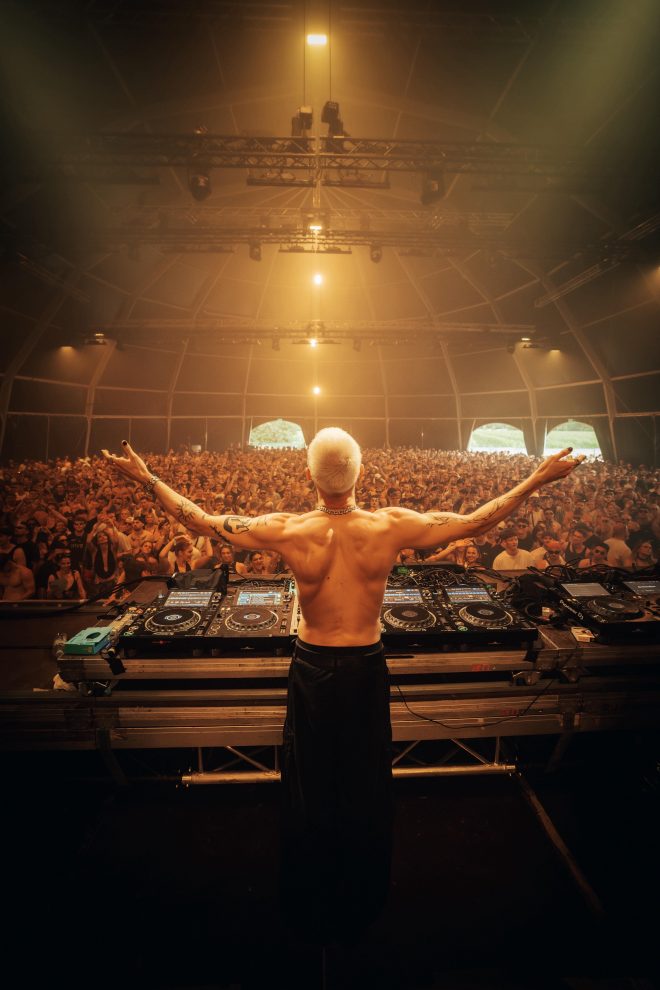KUKO – The Wound That Dances: Techno, Heartbreak, and the Storm Behind ‘Die Tonight EP’

Sometimes, techno doesn’t need to be colossal to leave a lasting impression. Sometimes it just needs to hurt.
At only 25, KUKO is carving out a rare space for himself, somewhere between the club and the confession booth. Based in Cologne, he’s building more than just a sound; he’s crafting a space for emotional intensity to thrive.
While much of the harder techno world still worships functionality over feeling, KUKO has chosen the latter. His latest release, Die Tonight EP, isn’t just music. It’s a rupture — a document of a man unraveling and rebuilding, alone, through voice notes, thunder, rain, and machines that cry.
“I worked on this project for almost a year. Mostly alone. At night. Just me and my laptop and a microphone,” he shares.
His voice is calm but loaded with weight, like someone who’s already cried and is now able to speak.
“I tried things, deleted ideas, and doubted myself. I wrote, rewrote, and felt everything, from grief to euphoria. This project helped me process a particular time in my life. And even though it was hard, I was grateful to have music to release everything that was buried inside.”
This isn’t an EP just for the dancefloor. It’s music that heals you no matter where you are.
It opens not with a drop, but with a voice memo: a man’s voice whispering “we can try it again”, followed by thunder, then rain. That rain stays with you, flowing through every transition, hiding inside the tracks, lingering like a feeling that won’t let go. It’s not just an aesthetic; it’s a memory. It’s how KUKO felt back then: like standing outside in a storm with no shelter and no plan.
“I consciously chose a different path. I didn’t want a loose compilation of tracks. I wanted something connected, with structure, purpose, and emotion,” he says.

The story unfolds with a failed attempt at rekindling love. “Die Tonight” is raw, intense, and unafraid of vulnerability; it describes the fear of being left alone. Followed by “Rette Mich” (“Save Me”), where the line “Schnee im Sommer” (“Snow in summer”) captures the contradiction of a time that seemed bright on the surface but felt cold underneath.
Then she comes back. Toxic. Her voice, sharp, angry, explodes through the EP. Accusations fly. The protagonist breaks. Everything collapses. And then comes “Destruction”, the most challenging, most aggressive track on the record. It doesn’t ask questions; it detonates. The relationship is over.
But heartbreak doesn’t end with silence. “Kummer” (“Grief”) picks up the pieces, slow and heavy. Loving someone who has hurt you is a specific kind of madness. KUKO captures it without a filter:
“Ich schließ die Augen doch der Schmerz ist nicht verschwunden; denn du drehst in meinem Kopf noch deine Runden”
(“I close my eyes, but the pain doesn’t disappear; because you’re still spinning around in my head”)
It hits like a gut punch, because it’s true. Too true.
Then comes “Traum” (“Dream”), the only feature on the EP, with Cologne-based rapper 9inebro. It takes a sharp left turn; the sound of relapse. Of romanticizing love despite everything. It’s an escape, a flashback, a lie we tell ourselves just to sleep:
„Der Raum ist heiß, doch ich bin am erfrieren“
(“The room is hot, but I’m freezing”)
„Wenn ich schlaf, dann träume ich von dir“
(“When I sleep, I dream of you”)
By now, it’s clear: this EP isn’t just therapy. It’s the wound itself.
The penultimate track, “In der Nacht” (“At Night”), evokes the feeling of driving at 3 a.m. with no destination. Nostalgic and melodic, it carries a new kind of weight: reflection. Distance. The pain hasn’t left, but it’s no longer screaming. It’s thinking:
„Ich hab dich nicht gesucht und doch gefunden“
(“I wasn’t looking for you, but I found you anyway.”)
„Was hast du nur mit mir gemacht?“
(“What have you done to me?”)
The EP closes with an Outro that echoes everything that came before. It’s a goodbye full of callbacks, melodic fragments, memories, lines we’ve heard already, but now softened. The female voice returns, but this time it’s different. She confesses she still thinks of him. Still loves him. There’s regret. Doubt. Maybe things weren’t as terrible as she once claimed.
And then the rain stops.
“I’ve lived through this story in very similar ways,” says KUKO.
“Every track on this EP comes straight from the heart. These are real moments, real emotions. But right at the end, I left something even more intimate; if you listen closely, you’ll hear me pushing back my chair, walking outside, and lighting a cigarette. It’s the sound of me exhaling everything. My head is clear. I’m free.”
But just before the fade-out, there’s a step. It sounds like the step lands in a puddle.
Maybe the story isn’t quite over yet.
What’s next?
“To be honest, I’m not entirely sure.
But maybe… maybe I’m already working on what’s next,” KUKO says with a smile.
My thoughts
Listening to Die Tonight felt less like consuming music and more like being invited into someone’s rawest memories. It’s rare to hear a techno record that strips away its armor this completely, letting every synth line, vocal (his own voice in nearly every track), voice memo, and drop tremble with emotional truth. What KUKO has done here goes far beyond production or arrangement; he’s made heartbreak audible. There’s no distance, no safety net — just a man processing pain in real time, and trusting us enough to let us witness it.
Kummer hit me the hardest. It’s not just a track about sadness; it’s about that very specific, soul-splitting ache of loving someone who uses your love as a weapon. The contradiction between tenderness and destruction, intimacy and silence — it all bleeds through that song. It reminded me of how pain can feel beautiful when it’s finally understood, when it’s held up to the light.
KUKO doesn’t ask for pity; he offers presence. He gives language to things we often leave unsaid. To stand in front of work this vulnerable is a privilege.
KUKO isn’t trying to impress. He’s trying to be real. And in that honesty, there’s so much power.
Die Tonight EP doesn’t just tell a story; it shows us the cost of feeling deeply in a world that often encourages numbness.
It’s not only a masterpiece. It’s a mirror.
And I walked away from it, not just moved, but changed.


